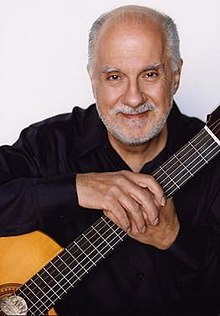Bossa nova is a relaxed style of samba developed in the late 1950s and early 1960s in Rio de Janeiro, Brazil. It is mainly characterized by a "different beat" that altered the harmonies with the introduction of unconventional chords and an innovative syncopation of traditional samba from a single rhythmic division. The "bossa nova beat" is characteristic of a samba style and not of an autonomous genre. The bossa nova wave became popular around the world; this increased popularity helped to renew samba and contributed to the modernization of Brazilian music in general.

Antônio Carlos Brasileiro de Almeida Jobim, also known as Tom Jobim, was a Brazilian composer, pianist, guitarist, songwriter, arranger, and singer. Considered one of the great exponents of Brazilian music, Jobim internationalized bossa nova and, with the help of important American artists, merged it with jazz in the 1960s to create a new sound, with popular success. As a result, he is sometimes known as the "father of bossa nova".
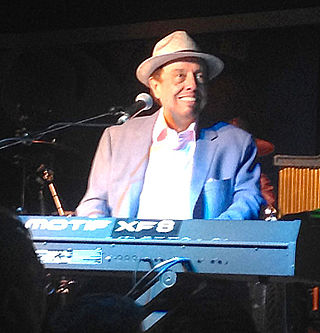
Sérgio Santos Mendes is a Brazilian musician. His career took off with worldwide hits by his band Brasil '66. He has over 55 releases and plays bossa nova heavily crossed with jazz and funk. He was nominated for an Oscar for Best Original Song in 2012 as co-writer of the song "Real in Rio" from the animated film Rio.

Luiz Floriano Bonfá was a Brazilian guitarist and composer. He was best known for the music he composed for the film Black Orpheus.
"Waters of March" is a Brazilian song composed by Antônio Carlos Jobim (1927–1994) in 1972. Jobim wrote both the Portuguese and English lyrics. The lyrics, originally written in Portuguese, do not tell a story, but rather present a series of images that form a collage; nearly every line starts with "É...". In 2001, "Águas de março" was named as the all-time best Brazilian song in a poll of more than 200 Brazilian journalists, musicians and other artists conducted by Brazil's leading daily newspaper, Folha de S.Paulo. It was also voted by the Brazilian edition of Rolling Stone as the second greatest Brazilian song.
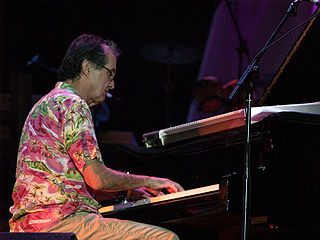
Donald Henri Grusin is an American jazz keyboardist, composer, and record producer. He is the younger brother of Dave Grusin.
"Wave" is a bossa nova and jazz standard song written by Antônio Carlos Jobim. Recorded as an instrumental on his 1967 album of the same name, its English lyrics were written by Jobim himself later that year.
"Samba de uma Nota Só", known in English as "One Note Samba", is a bossa nova and jazz standard song composed by Antônio Carlos Jobim with Portuguese lyrics by Newton Mendonça. The English lyrics were written by Jon Hendricks. It was first recorded by João Gilberto in 1960 for his album O Amor, o Sorriso e a Flor.
"Água de Beber" is a bossa nova jazz standard composed by Antônio Carlos Jobim and originally recorded in the key of A minor, with lyrics written by Vinícius de Moraes. The English lyrics were written by Norman Gimbel.

Dorival "Dori" Tostes Caymmi is a Brazilian singer, songwriter, guitarist, arranger, and producer.

Tudo Bem! is an album by American jazz guitarist Joe Pass and percussionist Paulinho da Costa that was released in 1978.
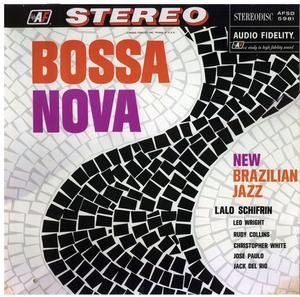
Bossa Nova: New Brazilian Jazz is an album by Argentine composer, pianist and conductor Lalo Schifrin recorded in 1962 and released on the Audio Fidelity label. The album was released during the height of the popularity of bossa nova music in the early 1960s and was one of Schifrin's earliest solo albums after leaving Dizzy Gillespie's band.

Elis & Toots is a 1969 bossa nova album by Brazilian singer Elis Regina and Belgian jazz musician Toots Thielemans recorded at a studio in Sweden and released on Philips Records. It features Toots Thielemans on harmonica, whistling and vocalizing playing guitar alongside. Thielemans and Elis Regina are actually heard on just four songs together, they both sit out on four of the twelve tracks. The accompanying quintet throughout comprises pianist Antônio Adolfo, Roberto Menescal, guitarist and the composer of four songs on the album, bassist Jurandir Duarte, Wilson das Neves on drums and Hermes Contesini on percussion. On three tracks Claes Rosendahl wrote arrangements for an additional string section.

Trombone Jazz Samba is an album by jazz trombonist and arranger Bob Brookmeyer featuring bossa nova compositions recorded in 1962 for the Verve label.
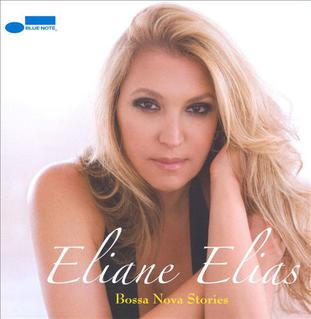
Bossa Nova Stories is the nineteenth studio album by Brazilian jazz artist Eliane Elias, released on 24 June 2008 by Blue Note Records. The album is a tribute to celebrate the 50th anniversary of the bossa nova music style.
"Triste" is a bossa nova song composed in 1966 by Antônio Carlos Jobim, who also wrote lyrics for it in both English and Portuguese.
"Só Danço Samba" is a bossa nova song composed in 1962 by Antônio Carlos Jobim, with lyrics by Vinicius de Moraes. English lyrics were later written by Norman Gimbel. On occasion, it has also been known as "Jazz Samba" and "I Only Dance Samba", an English translation of the original Portuguese title.
"Ela é Carioca" is a bossa nova song composed in 1963 by Antônio Carlos Jobim, with Portuguese lyrics by Vinícius de Moraes. English lyrics were written by Ray Gilbert. The song is sometimes titled "Ele é Carioca ."

Luiz Bonfá Composer of Black Orpheus Plays and Sings Bossa Nova is a 1962 album by Luiz Bonfá arranged by Lalo Schifrin.
